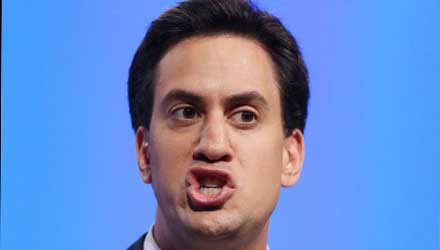Stan Keable, secretary of Labour Party Marxists, calls for an end to begging and bullying in return for crumbs
Dear comrade
As someone who supported your 2013 election campaign to become general secretary of Unite, Britain’s biggest trade union and biggest affiliate to the Labour Party, I am writing to offer some comradely criticism. Specifically I urge you to reconsider your negative attitude towards the Labour Party.
Your approach differs only in degree from Len McCluskey. Earlier this year he said that if Labour did not serve the interests and hopes of the working class the unions might have to find another way. This position may sound strong – threatening to withdraw vital union funding in order to get our way. But actually it reveals a weak, subservient, slavish mentality, which to all intents and purposes accepts that the rightwing, pro-capitalist, careerist politicians will always remain in control. We should not be aiming to bully or beg them into conceding a few crumbs, but winning control away from them.
Hence LPM’s strategic aim of transforming the party into a permanent united front of the whole of the workers’ movement. We seek to transform Labour into an organisation which includes all trade unions, socialist groups and pro-working class partisans. Something which, for us, goes hand in hand with winning the working class to the Marxist programme of human liberation.
At a time when the fight is on to defend the Labour-trade union link your comment that Unite should stop “infiltration through recruiting members to the Labour Party” dovetails perfectly with Tory media misinformation.1 As if trade unions are external to the Labour Party. Of course, Unite came about through a merger of constituent unions such as the engineers’ and transport workers’ unions which were founding affiliates of the original Labour Representation Committee back in 1900.
You say: “Unite should end immediately its disastrous ‘reclaim Labour’” policy. But the only thing wrong with this aim of ‘reclaiming’ is the illusion that the Labour Party ever had socialist politics. The Labour Party has always been led by reactionary politicians who are committed body and soul to capitalism. Even when ‘clause four socialism’ was adopted in 1918, this was never more than a sop to satisfy an increasingly militant working class.
From the beginning, Fabian leaders like Sidney and Beatrice Webb, Keir Hardie and Ramsay MacDonald, campaigned for independent working class political organisation (ie, independent of the Liberal and Tory parties) in order to put working class representatives in parliament. But they did not develop independent working class politics. The first Labour MPs, mostly trade unionists, went into parliament with the same politics as the Lib-Lab MPs before them. And these professional politicians – the Parliamentary Labour Party – quickly became the dominant section of the party, politically independent of conference, albeit held in check on occasion by the trade union bureaucrats who traditionally provided most of the funds.
Your October 24 press release complains about “Labour being given members’ money hand over fist and unconditionally”, despite which “The man Unite gave £10,000s to become Labour leader, Ed Miliband, treated them with complete and utter contempt.” In a similar vein, during the Unite election campaign, interviewed by the Bristol Post, you said: “I think we should stop giving the Labour Party money if they are not going to support our principles in their policies. We should keep our members’ hard-earned money tightly in our grasp, and use that to negotiate with the party – we should only give the party money as a reward, because giving it as an incentive doesn’t work.”2
Of course, the union is free to decide how to spend its money, and whether or not to affiliate to Labour. But affiliation is about much more than money, and the debate about the Labour-trade union link should not be primarily about funding. Affiliation, like individual membership, carries rights – the right to play a part in collective decision-making, the right to democratically determine policies and practices.
With all its faults, the Labour Party is just as much a part of the workers’ movement as the trade unions which created it over 100 years ago. The struggle for trade union democracy and the struggle for Labour Party democracy are in fact one and the same. The fight for working class politics (ie, Marxism) in the trade unions and the fight for working class politics in the party are inseparable from the task of winning the majority of the working class to class-consciousness and active involvement in organised political struggle.
Your September 9 complaint against Unite to the certification officer about the union’s general secretary ballot magnifies possible irregularities out of all proportion, and adds grist to the mill of the Tory and media witch-hunt targeting McCluskey and (ex-) Grangemouth convenor Stevie Deans, as if they are ballot-riggers in the Labour Party and ballot-riggers in the union. They are nothing of the kind. Unite activist Charlie Pottins got it right:
“Since the election for general secretary was supervised by the Electoral Reform Society, there is surely no suggestion that one of McCluskey’s minions was caught stuffing ballot boxes? If not, what we are left with is a technical irregularity, and it [ie, Jerry Hicks’s complaint – SK] reminds me of the kind of objection we have seen the employers and their lawyers coming up with to challenge strike ballots.”3
The aim of the Tory witch-hunt, of course, is to denigrate effective trade unionism in general and the Labour-trade union link in particular. All part of a desperate attempt to undermine Labour’s electoral support and boost Tory chances of staying in office beyond May 7 2015.
As you know, the Labour Representation Committee and its journal, Labour Briefing, declined to take sides between you and McCluskey. But Labour Party Marxists (an LRC affiliate) supported your campaign. That despite your attitude to the Labour Party. We stand with you all the way on the need for rank-and-file organisation and militant action to fight austerity, closures and job cuts, and confronting the anti-trade union laws which make effective solidarity illegal.
What clearly distinguishes you from McCluskey is your anti-bureaucracy, anti-careerist proposals: “The election of all officials, elected by members, not appointed by an individual or a panel … For a general secretary to live the life of the members they represent, on an average member’s wage, not a six-figure salary.”4 But militancy in defence of workers’ rights, wages and conditions – or militancy to make fresh gains, for that matter – is not enough. Any gains made can only be temporary, so long as the capitalist system of wage labour, of exploitation and oppression, remains. I am sure you agree.
Our class needs its own independent politics – not just to fight for concessions within the system, but to supersede it positively by replacing capitalist class (minority) rule with working class (majority) rule in transition to a classless society. We urge you to drop your equivocal attitude to the Labour Party, and commit wholeheartedly to the struggle to transform it into “an instrument for working class advance and international socialism”.5
Notes
1. October 24 2013 press release: www.jerryhicks4gs.org/2013/10/pressrelease-press-release-press.html.
2. www.bristolpost.co.uk/Bristol-s-Jerry-Hicks-faces-biggest-job-interview.
3. randompottins.blogspot.co.uk.









